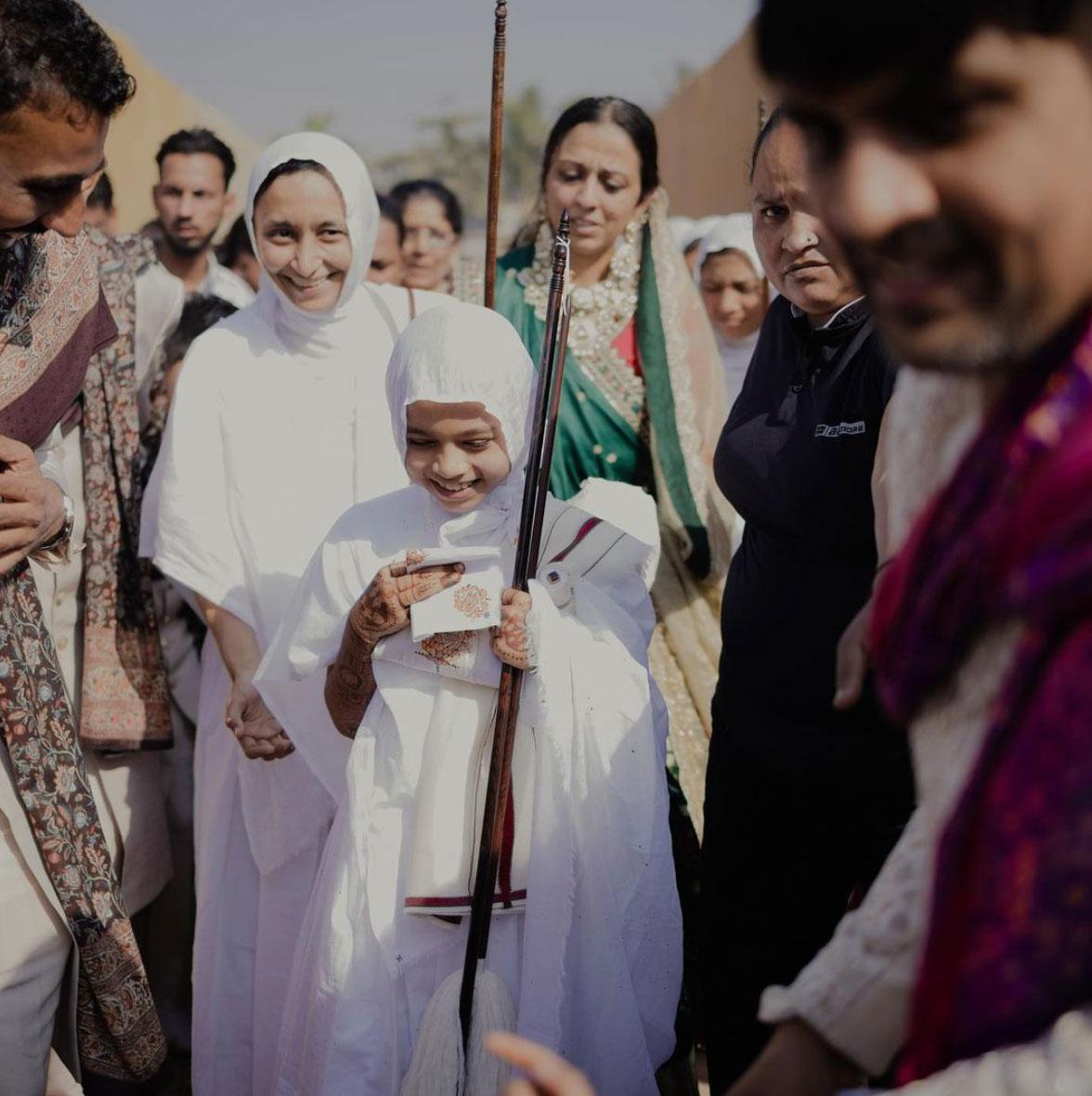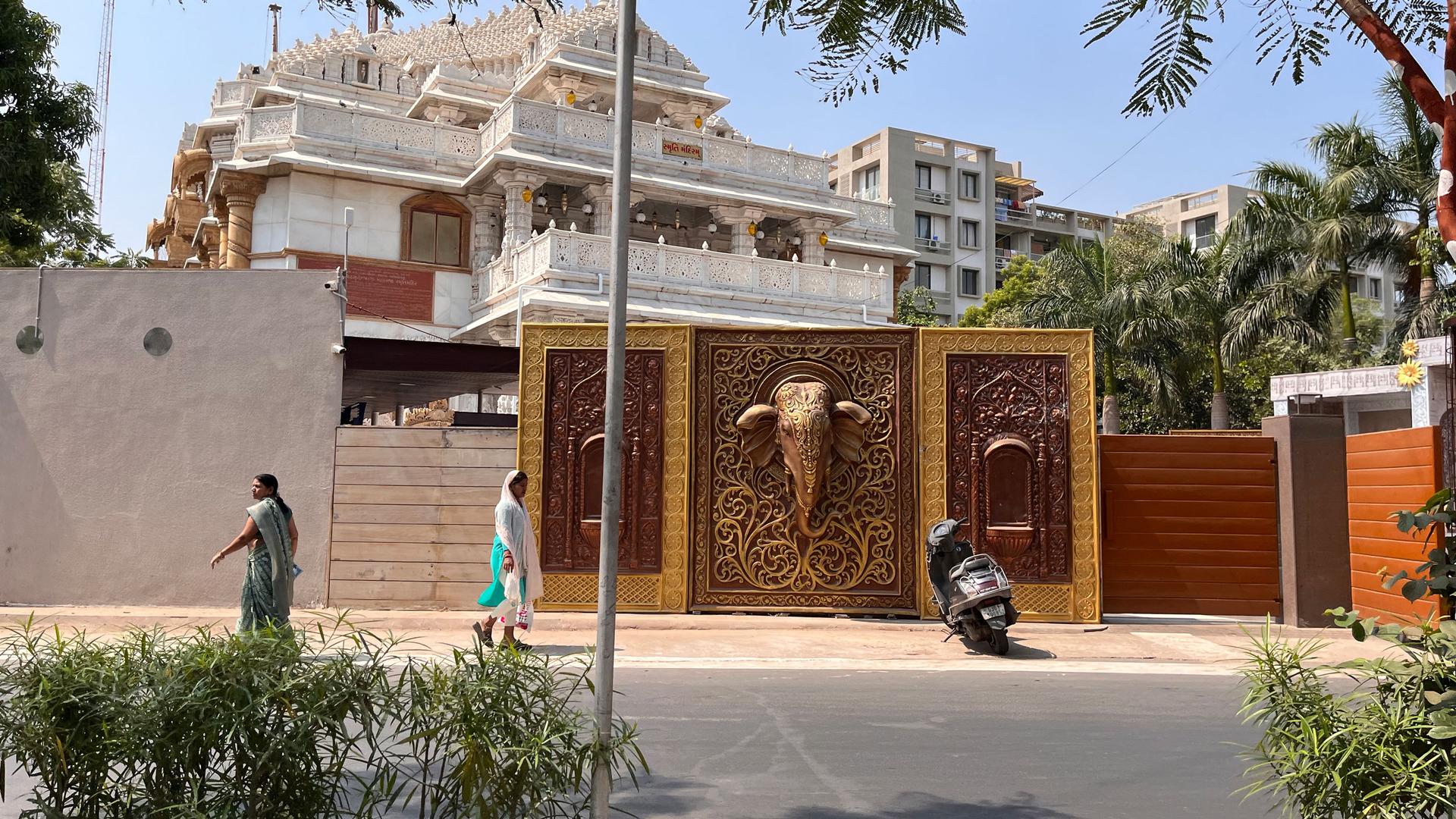Everything in Devanshi Sanghvi’s room is pink — the drapes, teddy bears, the wall, even the giant slide on the side of her bed.
Her parents said the little girl drew inspiration online and picked everything in the room herself. But despite decorating it meticulously, Devanshi Sanghvi never lived in the room or saw the final look because in January, Devanshi, at 8 years old, renounced the world to become a nun.

Devanshi Sanghvi’s family lives in the city of Surat, in western India, and are followers of Jainism, an ancient faith born in India thousands of years ago.
Today, less than 1% of Indians are Jains. They are one of the most-educated and wealthiest groups in the country. An unusually high number of Jains also become ascetics, choosing to lead a life of extreme austerity to achieve the ultimate spiritual goal of salvation.
The practice is called diksha and its popularity — especially among young girls and women — continues to grow.
In photos from her initiation ceremony, Devanshi Sanghvi has henna patterns on her palms and heavy jewelry around her neck. On the eve of her initiation, she rode on an elephant in a grand procession through Surat as crowds gathered to receive the materialistic possessions — clothes, money — she was discarding.
On the final day of the five-day ceremony, she gave up the finery for a simple white garment, had her hair shaved, bathed one last time and said her goodbyes.
She now lives more than 150 miles away from home in Ahmedabad, along with other nuns, in a simple residence devoid of electricity or any other comforts.

She wakes up at 5 every morning and spends her day studying scripture and helping the older nuns in their chores, she said. She’s shy but seems cheerful and gets excited when it’s time for her Sanskrit lesson.
Other nuns in the residence are much older than her — some of them are lawyers and engineers. Heena Desai said her own daughter, an MBA graduate, left a good job offer to take initiation two years ago.
“As a mother and she being my only child, it was a little difficult for me in the beginning to let go of her,” said Desai, a former school principal. “But when I realized that eventually, she is doing something which is going to make her happy …there was no reason for me to say no.”

The nuns follow the principle of nonviolence, a central tenet of Jainism. They take care not to harm even a small insect. Before sitting down, they clear the floor with their whisk broom to remove any creatures out of the path of harm. They don’t use electricity because they believe generating it harms a lot of living beings.
The nuns also strive for nonattachment, not even to their residence.
“They keep moving from one place to another so that there is no feeling of possession, there is no feeling of attachment,” Desai said.

Ruthpragnya Shree, a 32-year-old nun who studied to be a civil engineer, said that aspects of the ascetics’ life that appear harsh — such as plucking out all their hair every six months or walking barefoot everywhere — are ways to detach from their physical body.
These are not hardships, she said. On the contrary, she finds the lives of regular people to be more difficult.
“In the regular world, you become so busy looking after others that you don’t get time to do anything for yourself, for your soul,” said Mausam Virvadia, a 25-year-old commerce graduate from Mumbai who aspires to become a nun.
When she visits the Jain nuns and looks at their lifestyle, she said, she feels like something is missing in her normal life.
“You depend on others for joy but as a nun, your happiness is in your hands,” she said.
This autonomy draws a lot of young Jain women toward renunciation, said religious scholar Manisha Sethi, author of the book, “Escaping the World: Women Renouncers Among Jains.”
“One should not negate their spiritual yearnings but having said that, I think especially for women or for young girls, it’s almost like an alternative lifestyle, which is available to you without any stigma attached to it,” Sethi said.
Jain nuns outnumber monks 4 to 1, Sethi said, and every nun she met while researching her book spoke about their independence.
“They did not have to wake up and prepare lunches and tiffins for their kids, they didn’t have to pander to the whims of a mother-in-law or a husband. So, this sense of autonomy and the sense of control and sense of power over their own lives both spiritually … but also generally … is something that is valued by the [nuns],” Sethi said.
While hundreds of Jains are initiated each year, it’s becoming increasingly rare for children. Child rights groups have raised concerns. Even though Jain scriptures allow initiation at the age of 8, Sethi said some within the Jain community discourage it.
But Sanghvi’s parents said that any criticism is due to ignorance.
To demystify the practice, they documented her initiation on Instagram, explaining the importance and rationale of each aspect of the ascetic life.
Her father, Dhanesh Sanghvi, said it was impossible to dissuade her. When her parents suggested that she wait two more years for her initiation, they said she replied, “Who can guarantee I’ll be alive after two years?”
“My mother, my sister, my wife, everyone — we questioned different aspects, we discussed. But her maturity was mind-blowing,” Dhanesh Sanghvi said.
“When she was 4 or 5 years old, I realized she is different,” Devanshi Sanghvi’s mother said, adding that she was very disciplined, never threw tantrums and showed great interest in Jain scriptures.
The path of diksha, or Jain asceticism, made sense for her.
“She is made for diksha only,” her father said.
“It’s spiritual enjoyment. And she feels that enjoyment,” her mother added.
Devanshi Sanghvi’s parents are proud of her but they still miss her. They can’t talk to her on the phone and only get to see her a couple times a year.
“She’s a piece of my heart,” her father said.
Devanshi Sanghvi smiled when her father’s message was relayed.
But when asked if she misses her parents, the 9-year-old nun was quick to respond: “No.”
The story you just read is accessible and free to all because thousands of listeners and readers contribute to our nonprofit newsroom. We go deep to bring you the human-centered international reporting that you know you can trust. To do this work and to do it well, we rely on the support of our listeners. If you appreciated our coverage this year, if there was a story that made you pause or a song that moved you, would you consider making a gift to sustain our work through 2024 and beyond?
